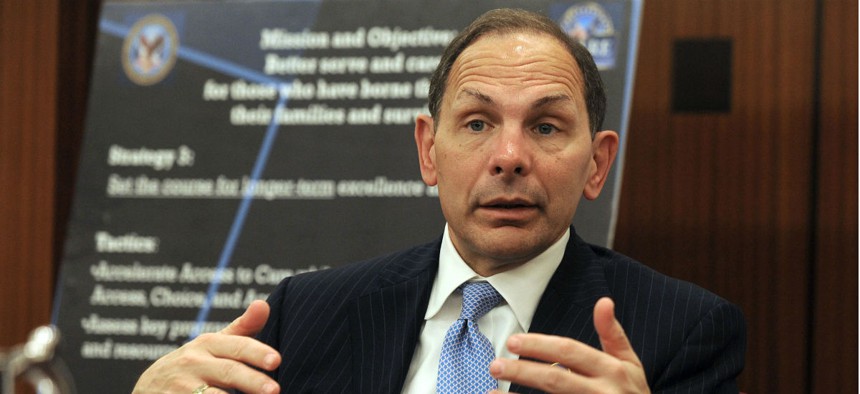
VA Secretary Bob McDonald would have broad power under the bill, but department officials say he already has adequate authority to claw back improper payments. Robert Turtil/VA file photo
VA Secretary Moves Closer to Obtaining Broad Authority to Recoup Employees’ Relocation Benefits
The legislation, which the department opposes, now heads to the House floor.
The Veterans Affairs Department secretary would be able to recoup relocation expenses from employees under a bill approved on Wednesday by a House committee.
H.R. 4138, which now heads to the House floor, would give the VA secretary broad authority to claw back all, or a portion of, moving costs paid to, or on behalf of any department employee. The bill would be retroactive, and would require the department to provide notice to employees of decisions to recoup relocation expenses. It would give employees the opportunity for a hearing before another agency or department before repayment. After that, the decision would be final and not subject to further appeal.
“We have asked the department time and time again to show us that the secretary does in fact have the explicit authority, and their answers have been incomplete and unclear,” said House Veterans’ Affairs Committee Chairman Jeff Miller, R-Fla., who sponsored the legislation. Miller noted that H.R. 4138 was based on the same authority granted to the VA secretary to recoup employee bonuses in a separate bill that the House passed in March 2015.
The panel reported out H.R. 4138 on Wednesday in an 18-4 vote (with two members not voting), but not without some debate.
Rep. Kathleen Rice, D-N.Y., offered an unsuccessful amendment that would have afforded employees directed to repay relocation expenses an additional appeal to the Merit Systems Protection Board. Rice’s amendment also would have added language clarifying that the secretary would have the authority to recoup such expenses from employees who have committed an act of “fraud, abuse or malfeasance.” Rice said without such language, the bill is “entirely too vague” and could lead to abuse and possibly retaliation against whistleblowers.
“I am surprised that my colleagues on the other side of the aisle would give the VA such a broad and poorly defined power,” Rice said during the markup.
While Miller supported the clarifying language, he objected to the MSPB review provision in Rice’s amendment, saying it would just add another layer to the process. “We need to streamline these processes, and not complicate and lengthen them,” he said.
Miller’s bill was inspired by the Veterans Benefits Administration relocation benefits controversy involving Diana Rubens and Kimberly Graves. VA Deputy Secretary Sloan Gibson earlier this year demoted the two senior executives based on poor judgment and creating an appearance of impropriety by not recusing themselves from discussions over job reassignments that they both personally gained from. (Graves and Rubens appealed, and the MSPB ultimately reinstated them to their jobs.)
As part of the controversial reassignments, VA paid roughly $274,000 in relocation expenses for Rubens, and about $129,000 for Graves, for a total of more than $400,000 – a sum that outraged lawmakers and many taxpayers. Most of those relocation expenses, however, were through the VA’s Appraised Value Offer program, which the department used as an incentive to attract highly-qualified candidates for hard-to-fill jobs. The governmentwide AVO program provides relocation services to employees to encourage them to move to locations that require specialized skills, allowing a government contractor to buy the employee’s home if it doesn’t sell in 60 days. VA has since indefinitely suspended its AVO program.
The VA has said publicly that it opposes H.R. 4138. The department, during an April hearing, said that it does have the authority to recoup improper payments, but the payments to Rubens and Graves, which they were eligible for and which were authorized by their supervisor, were not improper, and so the department lacked the legal authority to recoup them. At the time, Miller said it was “unfortunate” that when Congress tries to give the department “the ability to change the culture, they rebuff it, or say they already have the authority and it’s not necessary.
The committee on Wednesday also advanced 11 other veterans-related bills during the markup.
NEXT STORY: 2.1 Percent Troop Pay Raise Moves Ahead in House







